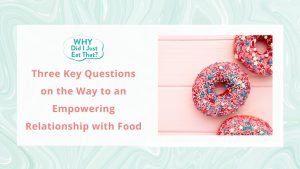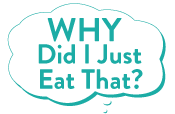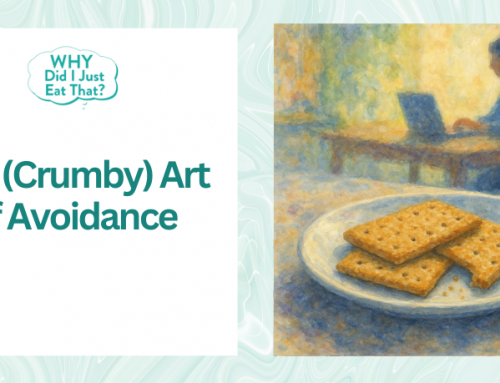 Between promoting my new book*, my day job working with patients, and the other important but uninteresting day-to-day chores that we all do without thinking, I certainly get what it’s like to feel overwhelmed from time to time. So it doesn’t surprise me that many people, feeling stressed out, seek to soothe their feelings through eating comfort-y foods. Of course, this type of disconnected eating can leave people unaware of how much they’ve consumed, or even what they just ate. This can lead to overeating and feelings of discomfort and guilt. So I recommend that people who tend to stress eat (at any level of stress) ask three key questions before opening the fridge.
Between promoting my new book*, my day job working with patients, and the other important but uninteresting day-to-day chores that we all do without thinking, I certainly get what it’s like to feel overwhelmed from time to time. So it doesn’t surprise me that many people, feeling stressed out, seek to soothe their feelings through eating comfort-y foods. Of course, this type of disconnected eating can leave people unaware of how much they’ve consumed, or even what they just ate. This can lead to overeating and feelings of discomfort and guilt. So I recommend that people who tend to stress eat (at any level of stress) ask three key questions before opening the fridge.
These three questions exist to encourage us to make conscious, empowered choices.
The first key question to ask yourself before indulging is a simple yet powerful one:
“Am I hungry?”
Asking yourself if you are hungry helps you pay attention to your body’s physical cues. Looking within will help you determine if you’re eating because you’re actually hungry, or because you’re feeling bored, or stressed, or upset. Understanding why you want to eat is the first step towards being more mindful about food. As you learn to recognize when your body truly needs nourishment, you empower yourself to make choices that honor your well-being.
The second key question goes a little deeper:
“What is it I Need Right Now?”
There are times when our cravings go beyond the realm of basic sustenance. Asking ourselves, “What is it I need right now?” allows us to take a moment to consider the emotional, spiritual, or psychological aspects of our desire to eat. Perhaps we’re not hungry, instead merely seeking comfort, validation, or a momentary escape from whatever is going on at that moment. Identifying the real source of our impulses enables us to address them in meaningful and sustainable ways. Please note: I am not trying to say that we should never eat out of the pure joy of enjoying food, for the flavor, the experience, or because eating is appropriate in certain social situations. What I am suggesting is that we might take a moment to consider what we are feeling when we open the fridge during stressful moments. With the awareness that there are other ways to self-soothe aside from food, we can explore alternative strategies to satisfy our emotional and spiritual needs.
The third key question is often ignored, but in many ways, it is the most important:
“How Will I Feel After I Eat This?”
The third question is sort of a bridge between the moment of choice (to eat, or not to eat?) and what comes after. Contemplate how you will probably feel after having a particular meal or snack. Are you likely to be happy you ate it? Might your body feel satisfied, or do you often feel regret? Are you considering eating more than is potentially comfortable? Pausing to take a mindful moment to think about what might happen next empowers you to make beneficial choices instead of acting on sudden urges. I believe that—absent medical issues—all foods fit, and honoring our bodies doesn’t mean avoiding certain types of treats, or even only eating when we are famished. But taking a moment to weigh the potential consequences allows us to make conscious decisions that align with our continuing well-being.
The Take-Away
Bringing these three questions into our eating habits underscores our commitment to ourselves. By incorporating mindfulness and intentionality into our relationship with food, we mindfully gravitate toward making beneficial choices. With self-awareness, we can start to manage the responses to our own triggered emotions. I often say, (contrary to that old expression, “We are what we eat”) in truth, “We are how we eat.” And when we eat with mindful empowerment, it sets us up for promising things in other aspects of our lives.
* Why Did I Just Eat That? How To Let Go of Emotional Eating and Heal Your Relationship with Food, available in stores and online after 1/09/24; just sayin.’




